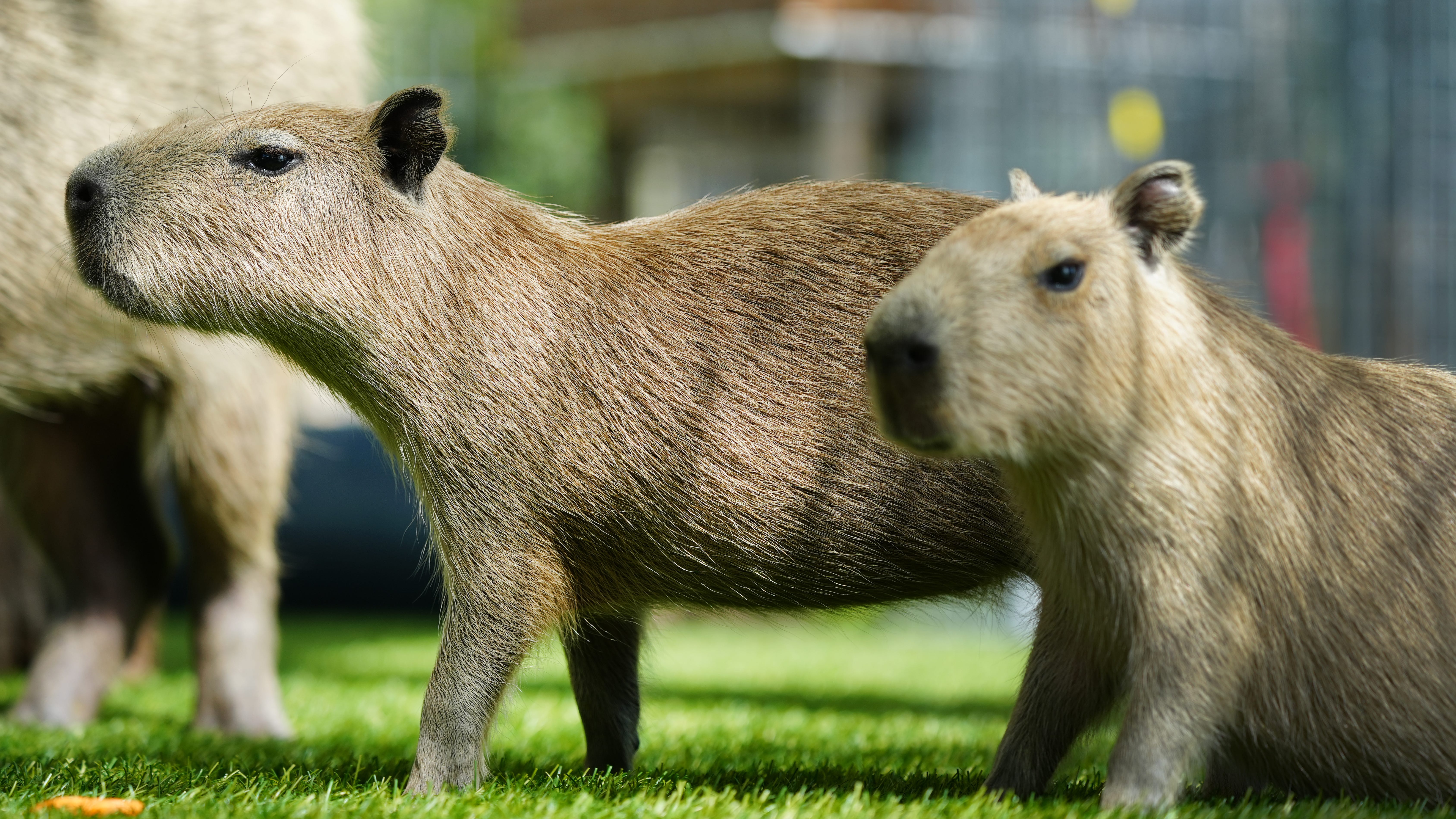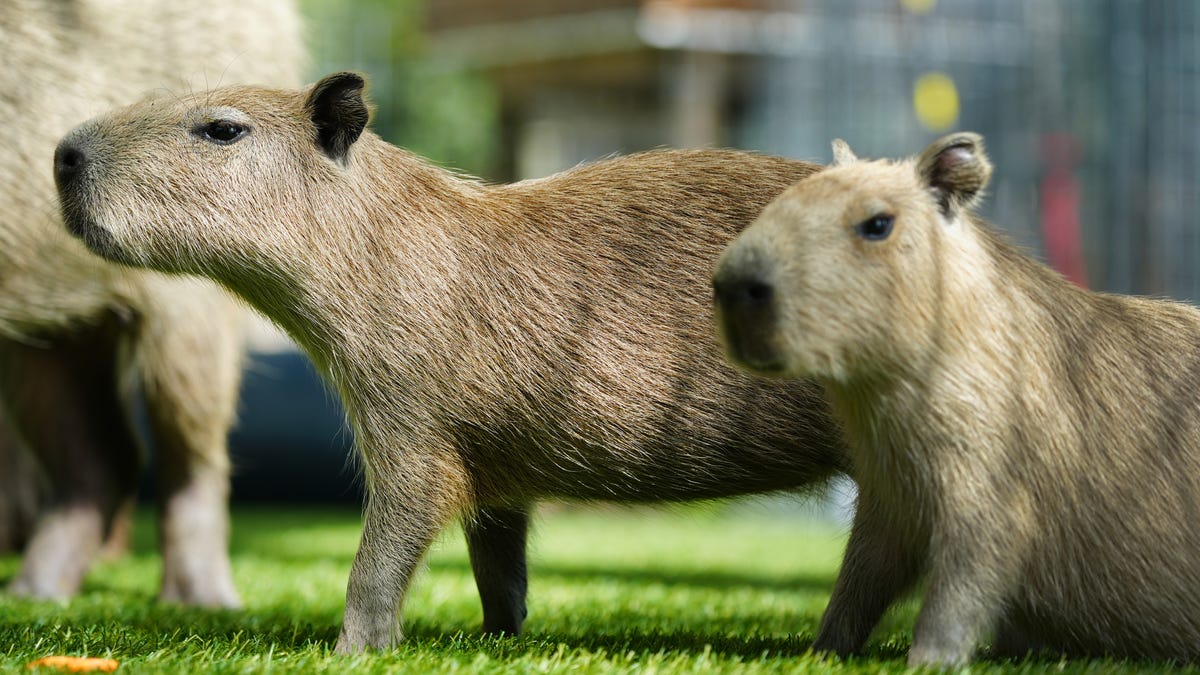
Capybaras in Florida? Here’s what to know
Capybaras are native to South America, but according to a UF study, the gentle, semi-aquatic animals have been spotted in the wilds of Florida.
- Capybaras, the world’s largest rodent, are native to South America but have been sighted in Florida.
- While there are reported sightings in Florida, an established breeding population has not been confirmed.
- Floridians can interact with capybaras at zoos, wildlife parks, and even two “capybara cafes.”
They’re calm and gentle oddballs that look like oversized guinea pigs. Meet the capybara, the world’s largest rodent.
Capybaras are native to South America, but according to a University of Florida/IFAS Extension study, the gentle, semi-aquatic animals have been spotted in the wilds of Florida.
According to a Florida Fish and Wildlife Conservation Commission database on EDDMapS, a web-based mapping system developed by the University of Georgia for documenting invasive species, there have been over 70 observations of wild capybaras in the Sunshine State. Per the UF study, most sightings occurred in north-central Florida, but observations were reported as far west as Gulf County and as far south as Collier County.
According to the map, the most recent sighting was in July 2024 in the Everglades, while the earliest took place in June 1992 in Alachua County.
How they might have gotten here is uncertain, but one story recounted in The Daytona Beach News-Journal contends five capybaras escaped from a wildlife facility near Gainesville in the 1990s. Most but not all were recaptured, the story goes. However, an established breeding population in Florida has not been confirmed.
But if you want to interact with a capybara in Florida, you don’t have to try to find one in the wild. Various Florida zoos and wildlife parks feature capybara encounters.
There are even two capybara cafes – in St. Augustine and St. Petersburg – where you can meet, feed and pet the gentle giants.
5 facts about capybaras
- Scientific name: Hydrochoerus hydrochaeris
- Size: Capybaras can weigh up to 150 pounds, grow up to 2 feet tall and over 4 feet long.
- Lifespan: Capybaras can live up to 12 years in expert care and 10 years in the wild, according to the San Diego Zoo.
- Evasion: Capybaras can stay underwater for up to 5 minutes to escape danger.
- Diet: Capybaras are herbivores. They eat grass, plants, leaves, bark, berries, fruits and vegetables.
- Teeth: Capybara teeth never stop growing
Do capybaras really eat their own poop?
Yes, they do (told you they were oddballs). But there’s a good reason.
According to National Geographic, capybaras eat their own feces in the morning “when it is protein-rich from the high number of microbes digesting the previous day’s meals.” Because the grass they eat is difficult to break down, they eat their poop to digest it a second time.
Map of reported Florida capybara sightings in FloridaCan you keep capybaras as pets in Florida?
Capybaras can be kept as pets in Florida, but a Class III wildlife permit from Florida Fish and Wildlife is required. Check local rules, regulations and ordinances for restrictions.
Permit applications can be submitted via Go Outdoors Florida.
- Class III permit duration: 2 years
- Cost: Free
- Activities covered: possession of Class III wildlife as a personal pet
- Private or Commercial: Private
- Age requirement: 16
Are capybaras good pets?
Just because you can, doesn’t mean you should. That saying applies when it comes to keeping capybaras as pets.
They’re expensive to purchase and care costs are high. Capybaras are social creatures and should not be kept alone.
They are are large – up to 150 pounds, over 4 feet long and 2 feet tall.
Capybaras need a large fenced area, a safe enclosure at night or when it’s cold, a pool, suitable food and costly veterinary care.
Since their teeth are always growing, providing branches and bark for them to chew on is essential.
Are capybaras friendly to humans?
Capybaras are very social and generally gentle and docile, but can bite if they feel threatened or provoked.
They’re generally friendly to humans, with many zoos and wildlife parks offering capybara encounters.
Florida is home to two capybara cafes where you can feed and pet the affable rodents.
Capybara Cafe St. Augustine, Florida
105 S Ponce De Leon Blvd, St. Augustine, Florida 32084
Capybara Cafe St. Petersburg, Florida
4703 Park St N, Saint Petersburg, Florida 33709
